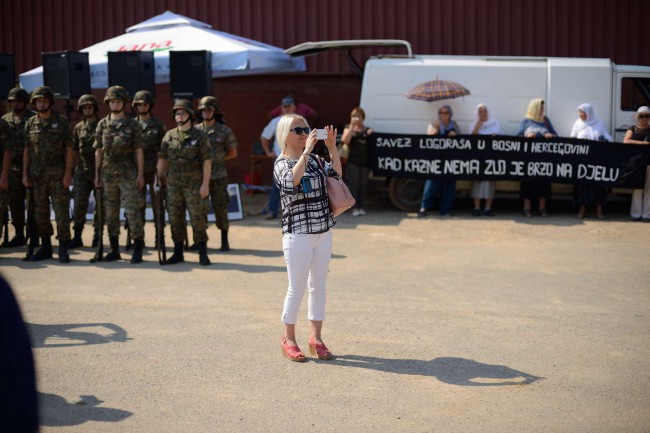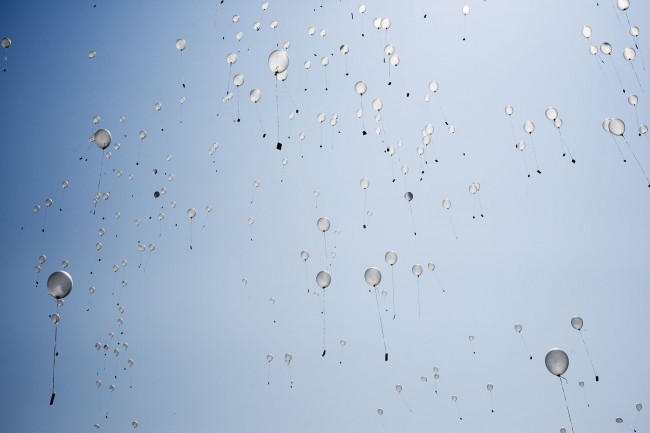My knowledge about Prijedor and the events in that town and its surroundings was gradual. Little by little, year by year, I found out bits and pieces of the horror that took place in this town in 1992. And each time, with each new thing I learn, I am overcome with sorrow and anger, thinking, how can a human being, complex by nature, do such things to another human being.
Literature, sociology, history, all of the humanities since their emergence until today have been dealing with this question, examining the complexity of humanity, and still – everything that has been written about past events sometimes hurts me just the slightest bit less than the events that unfolded during my lifetime, somewhere close to me.
Hence my personal decision to join colleagues who planned to visit Prijedor during the commemoration of the victims at Hrastova Glavica, in Trnopolje and Omarska. It is never the right time to visit such places, because they always bring up difficult and powerful emotions, and nightmarish images remain in my head for days. I am trying to understand, without relativising, I am trying to explain it to myself, without turning it into a justification, I am trying to find out as much as I can, but the information boils down to reading court judgements written in dry legal prose.
I try to imagine what it was like to live in this place in 1992, when everyone feared everyone else, when neighbours took away neighbours, never to be seen again. What was it like to order Muslim houses to hang white flags, and what was it like to obey that order, hang a white sheet out your window, put a white band around your arm, and marked like that hope that it would all soon pass.
I enter Prijedor on the afternoon of 5 August, happy that I don’t have internet access, because I know that commemoration of the anniversary of Operation Storm (B/C/S: Oluja) has given rise to a difficult and sorrowful debate in which everyone is a little bit right, but no one is completely right, and that little bit of truth is divided into splinters with everyone grabbing and holding on to their morsel of truth, because no one wants to know the whole story. These are my thoughts as I enter Prijedor where it is warm and in the narrow streets of the old part of town people mostly drive cars with foreign licence plates. It is August, the time of return visits by those that managed somehow to escape, to at least save their lives.
That evening, our plan was to attend events at the site of what was once the Trnopolje camp, and it is already late when we set off, in a vehicle with Belgrade plates, us four women. We get lost, maps are unreliable, roads unmarked, but this is no coincidence, I think to myself, it is dark and deserted. We stop at a petrol station to ask for directions to the memorial. The woman asks us who we are visiting in the area. We say we are meeting some friends. “By the memorial?” “Yes.” Her directions take us to the right road.
By the memorial.
And the memorial was erected to fallen fighters of Republika Srpska, just so, right there, as if its whiteness and wings were put there to remind the dead multitudes that the war still goes on, that it is not enough that the victims sacrificed their lives, that even in their deaths they need to be used for another message to the others. Somewhere behind the memorial, we see car headlights, so we go to what was once a school yard and for a few months the site of the camp.
In Prijedor I know Edin Ramulić, an activist doing to most difficult job after the war: seeking dignity for victims, and dignity for the survivors, and I used to know an Alma, but she doesn’t live there any more. And yet, as we reached the area covered by carpets, with a tent by the side, I greeted many people. How do we know each other? From similar actions in the region, or from social networks where we had recognised each other by some basic values and now defend each other from attacks by those “others”. Those that would wage war again, because they haven’t had enough, those that still seem to be in the majority.
The clatter of plates, they are calling us for dinner. It would be a disgrace to refuse, a disgrace to accept. I never eat at graveyards, even though they tried to teach me how this is done for the peace of the soul, to feed the departed, still I cannot, I keep thinking how many had gone hungry here, how many died of starvation, and I had already had two square meals that day… still, it is proper, we are guests, so we sat down, until a round table started about “The Role of the Media in Preventing Genocide”.
The topic was both so wide and so narrow – you don’t know what to say, and then again, everything has already been said and every additional word sounds empty. Some reporters, with two female reporters among them, talked about the media, about the photograph by Ed Williams that helped the world find out about the camps in Prijedor, so they quickly shut them down, about reporting, about how there is no freedom, no objectivity, even today, let alone in war reporting. And we never managed to reach the point: preventing future genocide. But we all knew somewhere deep inside that it keeps happening, even now, not here, but somewhere in the world, someone is torturing and killing some other people…
In the morning, we got in line in Kozarac to go towards Omarska where once a year, the owners of the Mittal iron ore mine allow entry into the premises of the mine to mark the anniversary of the closing of the camp that had been situated there. They say that with special permits you could enter the premises throughout the year, but you know how accessible a place is if you need a special permit to enter it.
The column moved on and then stopped somewhere in a grove of trees.
People got out, we hear them talking about how last year they could not get in, there was some problem with members of the BiH armed forces being there… A man stopped and took a photo of us by our car with the Belgrade plates, and then the plates themselves, he nodded… Not long after that, we heard a police siren. Driving down the empty lane, going by the cars, but they stopped at our car, “You can get in, the column will move on soon.” Why us? Let’s not try to guess, thought it’s quite clear why.
Down rugged and rutted paths filled with grit (I’m not that good with the terminology, the small yellow stones that leave a heavy dust when you walk on them, what are they called?), we reached a so-called parking area from where we continued on foot.
We met an acquaintance, with an injury, on crutches. In the book “The Innocent – Book of Missing Persons from Prijedor” that I happened upon the previous day, I had counted 49 people with the same surname as his. And the book had 3254 pictures of people, three in a row, three rows on a page, in alphabetical order…
In the area between the “White House” and the factory halls, a stage has been set up, army guards, testimony of survivors heard from the speakers… about how they were tortured, about how those that died there were tortured. Inside that “White House” that looks like some abandoned run-down white shack, some might say that the walls are silent because what they have witnessed cannot be described without turning into stone, the kind of stone the house is made of.

The voice of the host from the speakers giving the floor to a religious leader. He started and then got carried away, speaking of the “Serb race”, about Habil and Qabil (Cain and Able), placing the crime here into the confines of holy books, and somehow concluding with the message, or at least that’s how I understood it, that to the very last man of this or that faith, there would be no peace here.
I didn’t feel well – I kept thinking, it would take just one man like him on the side that I’m coming from and we’d have a war again. To the last man.
Speeches followed, the daughter of a victim said simply: “Never forget, never forgive.” And I kept thinking – never is a long word, longer than a human lifespan, than many human lifespans, so why does it have to be never?
And it was sad and painful and difficult… with the sun doing its seasonal work, draining rivulets of sweat from my body, and me being ashamed to think about the head: “Living people were held here, without water or food, for months, and you’re complaining about the heat…”
A politician and representatives of the prison camp detainees association got to the microphone, their story was not about “never”, they said something, one even said: “Come, and bring your neighbours, Serbs, Croats…”
At the end, everyone took a white balloon, with a white string and a piece of paper with the name of a victim killed in Omarska at the end of it. There were about seven hundred of them. And three thousand has passed through the camp.
The white balloons flew up.
Lighter than souls, they soared towards the sun.
Leaving the earth with its weight.
For it to pass, for it to never happen again.
